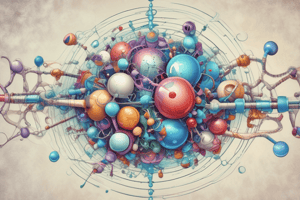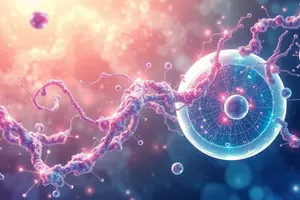Podcast
Questions and Answers
Which process involves the chemical transformation of drugs into less active or inactive compounds?
Which process involves the chemical transformation of drugs into less active or inactive compounds?
- Distribution
- Absorption
- Excretion
- Metabolism (correct)
What is pharmacology primarily concerned with?
What is pharmacology primarily concerned with?
- The study of drug development
- The study of how drugs affect the body (correct)
- The study of drug manufacturing processes
- The study of drug pricing
What is the study of how drugs are absorbed, distributed, metabolized, and excreted by the body called?
What is the study of how drugs are absorbed, distributed, metabolized, and excreted by the body called?
- Pharmacodynamics
- Pharmacoepidemiology
- Pharmacogenetics
- Pharmacokinetics (correct)
Which area of pharmacology deals with the study of drug effects on the body?
Which area of pharmacology deals with the study of drug effects on the body?
What are drug receptors?
What are drug receptors?
Which drug serves as an antagonist for opioid receptors?
Which drug serves as an antagonist for opioid receptors?
What is the process by which drugs spread throughout the body and become available to their target sites?
What is the process by which drugs spread throughout the body and become available to their target sites?
Which of the following describes an agonist?
Which of the following describes an agonist?
Which subfield of pharmacology studies the use and cost of drugs in the population?
Which subfield of pharmacology studies the use and cost of drugs in the population?
In pharmacodynamics, what do antagonists do?
In pharmacodynamics, what do antagonists do?
How are pharmacodynamic effects typically described?
How are pharmacodynamic effects typically described?
What do pharmacogenetics and pharmacogenomics focus on?
What do pharmacogenetics and pharmacogenomics focus on?
Flashcards are hidden until you start studying
Study Notes
Pharmacology is the scientific study of the action and effects of drugs on living systems and the interaction of drugs with their targets. It encompasses the study of both prescribed and over-the-counter medications, legal and illicit drugs, natural and synthetic compounds, and drugs that produce benefit, harm, or both benefit and harm. Pharmacology is divided into two main areas: pharmacodynamics and pharmacokinetics.
Pharmacodynamics
Pharmacodynamics is the study of how drugs affect the body and the mechanisms by which they produce their effects. It focuses on the interaction between drugs and their targets, which can be enzymes, receptors, or other molecular targets. Pharmacodynamic effects are typically described in terms of the drug's potency, selectivity, and efficacy.
Drug Receptors
Drugs can interact with receptors, which are proteins inside or on the surface of cells that mediate drug activity. Receptors respond to specific neurotransmitters, hormones, antigens, chemicals, or substances. When a chemical (ligand) binds to a specific site (receptor), it triggers a response in the cells. The intracellular changes initiated by the ligand-receptor complex can be through direct or indirect action.
Agonists and Antagonists
The ligand generally functions as either an agonist or an antagonist. An agonist will mimic the endogenous ligand to produce a similar response, while an antagonist blocks the usual ligand and thus inhibits the physiologic response. For example, morphine is an agonist for opioid receptors, while naloxone is an antagonist for opioid receptors.
Pharmacokinetics
Pharmacokinetics is the study of how drugs are absorbed, distributed, metabolized, and excreted by the body. It focuses on the movement of drugs within the body and the factors that influence their concentration and efficacy over time.
Absorption
The process by which a drug enters the body and becomes available to exert its action. This can occur through several routes, including oral, intravenous, subcutaneous, or transdermal.
Distribution
The process by which a drug spreads throughout the body and becomes available to its target sites. This is influenced by factors such as protein binding, distribution into body compartments, and tissue uptake.
Metabolism
The process by which drugs are chemically transformed into less active or inactive compounds. This is typically carried out by enzymes in the liver, and it can also occur in other tissues.
Excretion
The process by which drugs and their metabolites are eliminated from the body. This can occur through several routes, including renal excretion (excretion through urine) and biliary excretion (excretion through bile).
Pharmacogenetics and Pharmacogenomics
Pharmacogenetics and pharmacogenomics are subfields of pharmacology that study the genetic basis of drug response. They focus on how genetic variations can influence drug efficacy and safety, and they aim to develop personalized medication strategies based on individual genetic profiles.
Pharmacoepidemiology and Pharmacoeconomics
Pharmacoepidemiology and pharmacoeconomics are subfields of pharmacology that study the use and cost of drugs in the population. They aim to evaluate the safety, efficacy, and cost-effectiveness of drugs in real-world settings, and they provide information to help healthcare providers and policymakers make informed decisions about drug use.
Conclusion
Pharmacology is a complex and multifaceted field that encompasses the study of drugs and their effects on the body. It includes the study of pharmacodynamics, pharmacokinetics, pharmacogenetics, pharmacogenomics, pharmacoepidemiology, and pharmacoeconomics. Understanding pharmacology principles is crucial for healthcare professionals, as it enables them to prescribe and administer medications safely and effectively, and to develop personalized treatment plans based on individual patient characteristics.
Studying That Suits You
Use AI to generate personalized quizzes and flashcards to suit your learning preferences.




